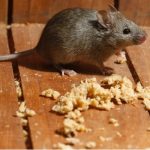Are Squirrels a Danger to Humans?
There are 65 varieties of squirrels across the entirety of the United States, and thanks to a change in climate populations are only increasing. You see them in the parks, skittering over telephone lines and stealing their lunch from bird feeders. They certainly aren’t the most unpleasant pest in nature – in fact, some might say they look cute with their soft fur and big eyes. But they’re still a form of untamed wildlife, so the question stands: are squirrels dangerous to humans? Do you need to turn around and run the next time you see one of these acorn-hungry individuals? And what do you do if they make their way into your home?
Squirrels and Humans in the City
Like other pests, squirrels tend to go the other way when humans approach. However, in more urban areas of New Mexico, the population has learned to see us as food sources waiting to be exploited. Studies are underway across the country on whether or not squirrels in metropolitan areas are getting bolder in their interactions with humans, or simply less concerned with oncoming threats altogether. The test concluded that, while they still do perceive humans as possible dangers, this instinct kicks in at a much closer distance than other predators. If they’re orphaned and particularly hungry, they may even come right up to you, climbing up and literally tugging on your pants sleeve to ask for food. In cases like that, what’s the harm in interacting with these furry little rodents?
Diseases and Bacteria on Squirrels
Squirrels are not usually aggressive, and in fact are rarely reported for catching rabies. However, they carry a variety of diseases, parasites and bacteria. They can pass on some of these illnesses to you and your household, and the parasitic pests on them can transfer even more of them. So, if you come into close contact with a squirrel, you’re vulnerable to:
- Tularemia
- Typhus
- Plague
- Lyme disease
- Encephalitis
- Rocky Mountain spotted fever
All of these diseases range in severity, with some being potentially fatal if left untreated. Even if a squirrel might not intend to attack you, their presence is enough to cause some serious damage. And that’s only one reason why you don’t want to share your space with them.
Squirrel Damage in the Home
If a squirrel finds its way into your home, it can easily do more than attract fleas or spread germs. Depending on where they get in, they may chew through your plumbing and cause leaks and water damage. Or, if they make their way into your wall voids, they could bite through your electrical wires and causes power outages and a possible electrical fire. Structural damage is inevitable with any squirrel infestation, and it can be incredibly difficult to get these new guests out once they’ve made themselves comfortable. For the sake of your health and the integrity of your home, it’s best when you need squirrel removal services to call the team at New Mexico Pest Control.
Squirrel Control in New Mexico
Nuisance wildlife is called that for a reason. Even if they’re cute, they still cause far more trouble than they’re worth. And while a squirrel might not put up too much trouble when you see it in the park, that doesn’t mean you should give it half your lunch. It also definitely doesn’t mean that you want it and its family to come home with you. If you have a squirrel infestation in your home, you need a controlled and humane effort to make your home your own again. New Mexico Pest Control has specialized in wildlife removal and exclusion techniques for over 70 years. That means that, when we get out those squirrels, we keep more from coming back. To learn more, contact us today!





